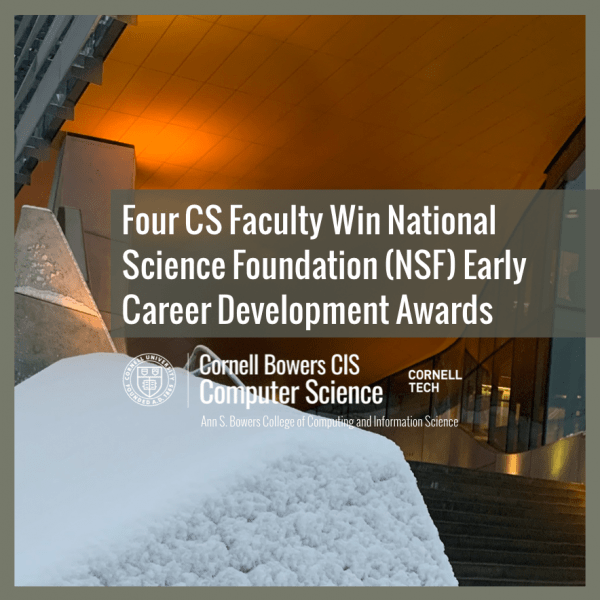Rachit Agarwal, Eshan Chattopadhyay, Chris De Sa, and Owolabi Legunsen, assistant professors of computer science in the Cornell Ann S. Bowers College of Computing and Information Science have been awarded National Science Foundation (NSF) Faculty Early Career Development Awards. These substantive awards—with financial support spread across the next five years—support early-career faculty who have, according to the NSF, "the potential to serve as academic role models in research and education and to lead advances in the mission of their department or organization."
Agarwal will work on designing more predictable data center networks. Such networks, which are currently unpredictable and inefficient, will enable systems that are not only correct by design, but also achieve orders of magnitude better performance and efficiency than today’s systems. This project introduces a fundamentally new service model – communication synchrony – that enables data center networks to guarantee bounded, predictable data transmission times. Educational and outreach activities will include creation of publicly available pedagogical materials and tools.
Chattopadhyay will use his award to further his study of pseudo-randomness, focusing on two main objectives: unconditional de-randomization (addressing the question of whether randomness is necessary in efficient computation); and extracting pure random bits from defective sources of randomness (including constructing better extractors in realistic models of defective random sources). The project also features activities designed to encourage undergraduates from disadvantaged backgrounds to choose computer science as a major.
De Sa will use his award to further his studies into artificial intelligence, with the goal of building new general statistical inference algorithms that will still run efficiently, even on very large datasets and very complicated models, while having provable reliability guarantees. The project will also advance education in AI through the development of open-source course resources that give students hands-on experience with how scalability and reliability interact in machine learning systems.
Legunsen will use the award on a project seeking to make runtime verification more effective and more efficient in software testing. The work will address several major obstacles, including the frequency of false alarms in signaled violations, and the expense of writing tests that cover code where specifications may be violated. Legunsen also plans to develop a runtime verification course, integrate runtime-verification modules into a software-testing course, and create publicly available pedagogical materials and tools.
The four assistant professors in CS join three colleagues in the College of Engineering (COE): Yudong Chen, Damek Davis, and Madeleine Udell.
Read more about their research in the Cornell Chronicle.



